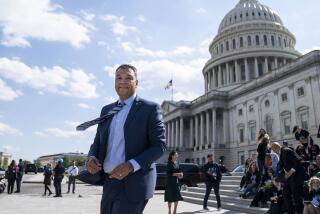Extremists Are Homing In on the Internet, Says Gonzales
Atty. Gen. Alberto R. Gonzales said Wednesday that more than 5,000 Internet sites were being used by extremists to train and coordinate internationally, filling the gap caused by the crackdown on the Al Qaeda terrorist network.
He also rebutted allegations circulating in recent days that the United States somehow prompted British authorities to move prematurely against a suspected London-area cell allegedly planning attacks on airliners with homemade liquid bombs.
Gonzales’ estimate suggests a significant expansion of the Internet infrastructure used by Islamic extremists in recent years to mobilize their efforts. Several counter-terrorism officials inside and outside the U.S. government said they were not familiar with the specific numbers quoted by the nation’s top law enforcement official, but added that they had seen a dramatic increase in Internet use by Islamic extremists.
Since late 2001, the United States and its allies have demolished Al Qaeda’s home base in Afghanistan, killed or captured some of its leaders, cut off many outside funding channels and disrupted some means of communication.
But those efforts have driven Al Qaeda members to the Internet, “where their ideology has inspired and radicalized others,” Gonzales said in a speech to the World Affairs Council of Pittsburgh.
“There are between 5,000 and 6,000 extremist websites on the Internet, each one encouraging extremists to cultivate relationships with like-minded people,” he said.
“This radicalization is happening online and can therefore develop anywhere, in virtually any neighborhood, and in any country.”
Militants radicalized on the Internet may be more dangerous than those trained in Al Qaeda camps in Afghanistan before the Sept. 11 attacks, Gonzales said.
“These are the home-grown terrorists that you have heard about,” he said, referring to the alleged plot in Britain and to other recent plots and attacks by Al Qaeda sympathizers.
Gonzales said radicalization may also be occurring in academic settings, mosques, community centers and -- of particular and growing concern -- in prisons.
In an appearance later Wednesday on CNN’s “The Situation Room,” he said the FBI continued to pursue tendrils of the investigation in the United States.
“There have been a number of tips and leads that tie to the United States, and that’s why we have had over 200 FBI agents involved in following up on every tip and every lead,” Gonzales said. “We’re not aware of a plot here in the United States, but we’re not prepared also to say that we’ve ended this threat.”
In his speech in Pittsburgh, Gonzales said last week’s disruption of the alleged British bomb plot came as a result of both countries cross-training their prosecutors and sharing information and sensitive intelligence.
Gonzales also said that Britain and the U.S. favored stopping terrorists before they could act, even if that meant ultimately losing convictions in court.
“Simply put, we need to gather enough information and evidence during our investigations to ensure a successful prosecution,” he said. “But we absolutely cannot wait too long, allowing a plot to develop to its deadly fruition.”
A senior Justice Department official said those remarks were intended to rebut allegations that U.S. officials pressured their British counterparts into rounding up the suspects before they were ready.
The attorney general is saying “there is no schism between the philosophies of the two countries as to when to take down a plot,” said the senior official, who spoke on condition of anonymity because of the international aspects of the British-led investigation.
“I don’t believe the plot was taken down because of American pressure. This was a British-run operation. As far as I know, there was little difference of opinion in this case on when to take down the plotters.”
Asked whether the United States pressured Pakistan into arresting one of the suspects, Rashid Rauf, on its soil, forcing British authorities to scramble to roll up other members, the official said: “I’m just not comfortable talking about the Pakistan end of this. That doesn’t mean the U.S. leaned on the Pakistanis. We just don’t want to discuss operational aspects of the investigation.”
More to Read
Get the L.A. Times Politics newsletter
Deeply reported insights into legislation, politics and policy from Sacramento, Washington and beyond. In your inbox three times per week.
You may occasionally receive promotional content from the Los Angeles Times.






